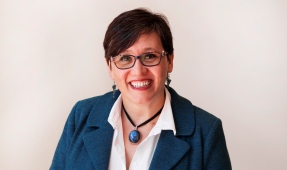Staff Snapshot: Silvia Martinez

Silvia Martinez is the Science in Australia Gender Equity (SAGE) Project Officer in the Office of the Deputy Vice-Chancellor and Vice-President (Academic). While you'll often find Silvia on Werrington North and Campbelltown campuses, the project takes her to all of our campuses.
Find out more about Silvia and her work on the SAGE Project in her Staff Snapshot….
When did you start working at Western and what was your first role?
I started at Western in 2009 as a research assistant on a casual basis for the Interpreting and Translation Research Group, then part of the College of Arts at Bankstown campus. That morphed into a fixed term Research Officer role, which flowed into coordinating the delivery of an international conference hosted by the School of Humanities and Communication Arts and the Institute for Culture and Society. Another fixed term contract took me to working as Project Officer in the Office of People and Culture, and subsequent secondments to the Office of the Chief Financial Officer and Badanami Centre for Indigenous Education. I ended my first six-year engagement with the University as School Administration Coordinator in Humanities and Communication Arts, a position I left in 2015 to work on a freelance basis in interpreting and translation (Spanish), project management and administration consultancies.
While continuing my engagement with the University on a casual basis in a range of areas over the past year, I applied for the SAGE Project Officer position and started in this role on a part-time basis in late September.
Describe your current role:
My current job is dedicated to the Science in Australia Gender Equity (SAGE) initiative and involves providing full support to the project through 2017 and 2018. Our University has signed up to participate in the Athena SWAN Australia pilot program, which involves an in-depth analysis of the policies and practices we have in place to deal with gender inequality and to develop action plans to overcome this inequality. The program particularly focuses on the Science, Technology, Engineering, Maths and Medicine (STEMM) disciplines, which is where the biggest gaps exist, but it allows us to consider impacts right across our organisation. It is an evidence-based project that seeks to engage academic and professional staff and students and has categories of participation leading to awards. The stage being piloted in Australia is the Bronze Award, which requires the organisation to self-assess as part of its application.
My role includes working with the Project Lead to develop and implement a project plan that will support data gathering and analysis activities, as well as internal and external engagement with interested parties, and provide support to the Self-Assessment Team which has assumed responsibility for the application process and action plan development.
What's the best thing about your job?
The fact that it allows me to work on an area I'm passionate about, with people who participate in the project because they want to, and with the full commitment of our University. It's a privilege to be able to contribute to something that aims to make such a positive impact and that can make a real difference to so many people's lives.
What do you love most about working at Western?
The commitment to excellence, commencing with the region we live and work in. My family migrated to Australia when I was child, and Western Sydney has been our home ever since. Having access to quality education that seeks to respond to the needs of the region and its people makes me very proud, and being able to contribute to this delivery even prouder.
What are you going to be working on in the next 12 months?
The next 12 months are actually the first 12 months of the SAGE project, so they will be very focused on analysing the data we have, identifying additional data we need and defining the main areas for action. The following year will build on this to develop a four-year action plan to take us beyond the project stage.
You can find out more about the project on the SAGE webpage (opens in a new window).
Mobile options:

